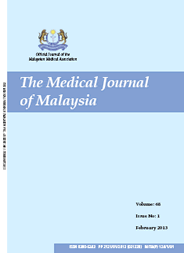MJM, Vol 70 Supplement 1 September 2015
Falls among older adults: Findings from screening
at the Ministry of Health Malaysia Primary Care Clinics
Institute for Public Health, National Institutes of Health, Ministry of Health, Malaysia, Kuala Lumpur
ABSTRACT
Introduction: Falls is a major health problem and disproportionately affect the lives of older adults. This study aimed to determine the associated factors for risk of falls among Malaysian older adults.
Method: This study was cross-sectional in design and using secondary data collected from Elderly Health Screening Form (BSSK/WE/2008/Pind.1/2012). It was a nationwide study involving 328 randomly selected Government Primary Care Clinics. Elderly is defined as a person aged 60 years and above. Descriptive and logistic regression analyses were conducted using SPSS version 19.0.
Results: Overall, 19.1% (95% CI: 17.86-20.42) of the elderly reported of experienced falls. The prevalence of falls were higher among females than males (19.5% vs. 18.7%), elderly aged 75 years and older than those who were younger (21.9% vs. 18.4%) and among rural than urban dwellers (21.2% vs. 17.8%). By ethnicity, the highest prevalence of falls was among the Indians, followed by Malays, Chinese and other ethnics (19.8%, 19.4%, 18.9%, 17.3% respectively). Multiple logistic regression revealed that falls were positively associated with taking one or more medicines (adjusted Odds Ratio (aOR) 2.33, 95% CI: 1.39-3.91), consuming alcohol (aOR 1.72, 95% CI: 1.06-2.80) and having heart disease (aOR 1.95, 95% CI: 1.37-2.76). Elderly who were current smokers, having hypertension, diabetes, asthma, kidney failure and epilepsy were not statistically associated with falls.
Discussion: Falls are a common problem among older adults, with potentially serious consequences. Our study found that elderly who were on multiple-drug treatment, consumed alcohol and diagnosed with heart disease were at higher risk for falls. A comprehensive and targeted program designed to reduce risk of falls is urgently needed.
Keywords: falls, older adults, Elderly Health Screening Form
